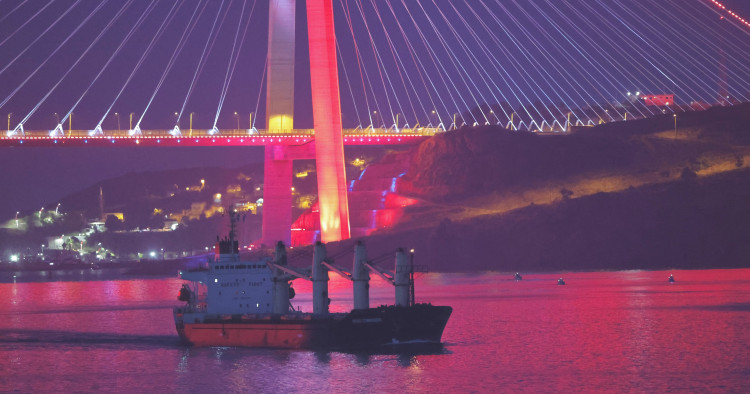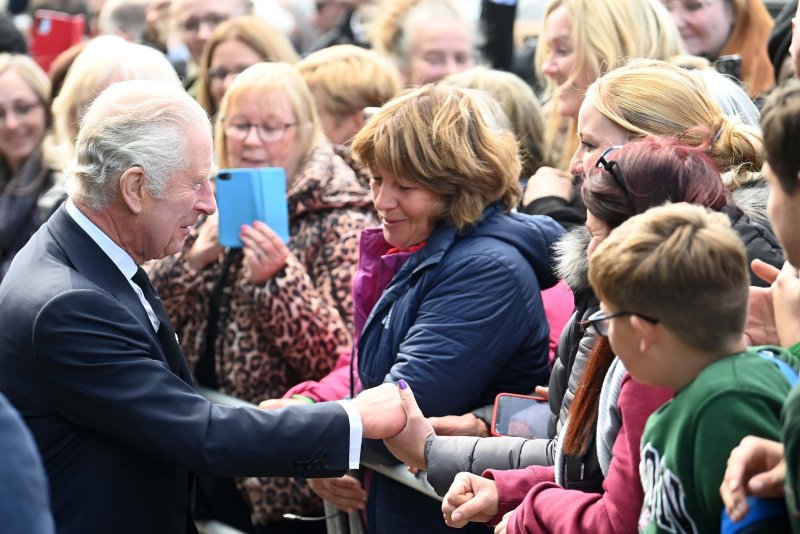TC Energy seeking to sell off $5B in assets in
2023 to fund future projects
The Canadian Press Nov. 9, 2022
The Canadian Press Nov. 9, 2022
TC Energy (TRP:CT)
61.66 1.50 (2.49%)As of: 11/10/22 4:12:49 am
REAL-TIME QUOTE. Prices update every five seconds for TSX-listed stocksChart Type - 1yearSee Full Stock Page »TC Energy Corp. is looking to divest $5 billion in assets next year, as the Calgary-based pipeline operator seeks to pay down debt and fund new projects.
In a conference call to discuss third quarter financial results Wednesday, chief executive François Poirier said TC Energy will seek to sell off non-core assets and minority interests to help finance its larger expansion goals without taking on large amounts of debt.
"We are opportunity rich," Poirier said. "And being opportunity opportunity-rich means we expect to sanction additional high-quality growth projects that will further differentiate TC Energy as an industry leader. So there is a need to balance our sources and uses of capital without the reliance on further external equity."
Poirier declined to provide specifics around which assets could be up for sale, though he said that the greenhouse gas emissions profile of individual assets will be a factor as the company seeks to reduce its carbon footprint.
In addition, he said a divestiture program will give TC Energy the capacity to move faster with some of its efforts to reduce its emissions by 30 per cent by 2030, and reach the target of net-zero greenhouse gas emissions by 2050. The company is exploring a carbon capture transportation and sequestration system in partnership with Pembina Pipeline Corp., and also has a partnership with Irving Oil to explore the development of low-carbon hydrogen opportunities.
On Wednesday, Poirier said he was encouraged by last week's federal fall economic statement, which pledged government support for the development of clean technologies as well as a new tax credit for hydrogen development.
"We've been working very hard to develop our capabilities in some of these new low-carbon areas," Poirier said. "Clearly, the incentives that have been presented both in the U.S. and Canada are going to accelerate our opportunity set in our low-carbon businesses."
TC Energy reported Wednesday that its third-quarter profit rose compared with a year ago as its revenue gained more than 15 per cent.
The company said it earned net income attributable to common shares of $841 million or 84 cents per share for the quarter ended Sept. 30, up from $779 million or 80 cents per share a year earlier.
Revenue for the quarter totalled nearly $3.80 billion, up from $3.24 billion in the third quarter of 2021.
During the quarter, TC Energy resolved a long-standing dispute with LNG Canada over projected cost overruns for the Coastal GasLink pipeline project, which TC is building to ship natural gas to the LNG Canada export terminal currently under construction near Kitimat, B.C.
The revised project agreements reflect a new total cost estimate for Coastal GasLink of $11.2 billion, up from $6.6 billion.
In August, TC Energy announced a strategic alliance with Mexico's state-owned electric utility for the development of new natural gas infrastructure in central and southeast Mexico.
As a result of that agreement, TC Energy announced it will go ahead with construction of the Southeast Gateway pipeline, a 715-km offshore natural gas pipeline to serve the southeast region of Mexico. That project is estimated to cost US$4.5 billion, and be complete by mid-2025.
REAL-TIME QUOTE. Prices update every five seconds for TSX-listed stocks
TC Energy Corp. is looking to divest $5 billion in assets next year, as the Calgary-based pipeline operator seeks to pay down debt and fund new projects.
In a conference call to discuss third quarter financial results Wednesday, chief executive François Poirier said TC Energy will seek to sell off non-core assets and minority interests to help finance its larger expansion goals without taking on large amounts of debt.
"We are opportunity rich," Poirier said. "And being opportunity opportunity-rich means we expect to sanction additional high-quality growth projects that will further differentiate TC Energy as an industry leader. So there is a need to balance our sources and uses of capital without the reliance on further external equity."
Poirier declined to provide specifics around which assets could be up for sale, though he said that the greenhouse gas emissions profile of individual assets will be a factor as the company seeks to reduce its carbon footprint.
In addition, he said a divestiture program will give TC Energy the capacity to move faster with some of its efforts to reduce its emissions by 30 per cent by 2030, and reach the target of net-zero greenhouse gas emissions by 2050. The company is exploring a carbon capture transportation and sequestration system in partnership with Pembina Pipeline Corp., and also has a partnership with Irving Oil to explore the development of low-carbon hydrogen opportunities.
On Wednesday, Poirier said he was encouraged by last week's federal fall economic statement, which pledged government support for the development of clean technologies as well as a new tax credit for hydrogen development.
"We've been working very hard to develop our capabilities in some of these new low-carbon areas," Poirier said. "Clearly, the incentives that have been presented both in the U.S. and Canada are going to accelerate our opportunity set in our low-carbon businesses."
TC Energy reported Wednesday that its third-quarter profit rose compared with a year ago as its revenue gained more than 15 per cent.
The company said it earned net income attributable to common shares of $841 million or 84 cents per share for the quarter ended Sept. 30, up from $779 million or 80 cents per share a year earlier.
Revenue for the quarter totalled nearly $3.80 billion, up from $3.24 billion in the third quarter of 2021.
During the quarter, TC Energy resolved a long-standing dispute with LNG Canada over projected cost overruns for the Coastal GasLink pipeline project, which TC is building to ship natural gas to the LNG Canada export terminal currently under construction near Kitimat, B.C.
The revised project agreements reflect a new total cost estimate for Coastal GasLink of $11.2 billion, up from $6.6 billion.
In August, TC Energy announced a strategic alliance with Mexico's state-owned electric utility for the development of new natural gas infrastructure in central and southeast Mexico.
As a result of that agreement, TC Energy announced it will go ahead with construction of the Southeast Gateway pipeline, a 715-km offshore natural gas pipeline to serve the southeast region of Mexico. That project is estimated to cost US$4.5 billion, and be complete by mid-2025.
GREENWASHING
TC Energy spending $146M to build solar power project in Alberta
The Canadian Press OCTOBER 2022
TC Energy Corp. says it is spending $146 million to build its first Canadian solar power project.
The company says the Saddlebrook solar project will be located near Aldersyde, Alta., south of Calgary.
It will have the capacity to generate 81 megawatts, enough energy to power 20,000 homes annually.
TC Energy says it has obtained all regulatory approvals and permits and construction is expected to be finished next year.
During the construction phase, the company says the project will involve about 140 workers.
Two full-time TC Energy employees will work at the facility once it is in operation.
TC Energy, Indigenous partners fall out after
end of Keystone XL
Robert Tuttle, Bloomberg News
AUGUST 2022
An Indigenous-backed energy company is seeking $50 million (US$38.2 million) from pipeline operator TC Energy Corp. after a falling out between partners on the now-abandoned Keystone XL project.
Natural Law Energy Inc., a group representing a number of Indigenous communities in Western Canada, is asking for “financial compensation for all the losses of income and the lost opportunities for future income” associated with an investment agreement signed in November 2020, according to a letter signed by Natural Law Chief Executive Officer Travis Meguinis and seen by Bloomberg News.
Natural Law agreed that year to invest as much as $1 billion in Keystone XL. US President Joe Biden pulled a key permit after taking office in January 2021, squelching plans to complete the 830,000-barrel-a-day pipeline.
Natural Law’s memorandum of understanding with TC Energy included possible equity stakes in other projects, according to Meguinis’s letter. But no deals came to fruition and TC Energy informed Natural Law that it intends to end the investment agreement, the company said in an email.
“Following the termination of the Keystone XL Pipeline project, TC Energy sought but was unsuccessful in identifying other commercial opportunities for investment with Natural Law Energy that met our shared goals and interests,” Calgary-based TC Energy said in a statement emailed to Bloomberg. “We have a long-standing relationship with the signatory Nations and remain committed to working directly with each Nation to understand their priorities and seek future opportunities to work together.”
'BAD FAITH'
Companies including TC Energy and Suncor Energy Inc. have turned to alliances and equity partnerships with Indigenous groups in try to overcome overcome opposition to building new projects. Energy infrastructure is seen by some people as a threat to Indigenous land and their traditional resources, though others back their involvement in pipelines as a way of alleviating poverty in those communities.
After Keystone XL’s cancellation, TC Energy and the Alberta government sought US$15 billion in compensation from the US government in a request for arbitration filed in November.
Natural Law was excluded from participating in the case and wasn’t told that such action would be brought, according to Meguinis’s letter. “This bad faith activity had damaged financial and economic opportunities for Natural Law” and its participating Indigenous groups, he wrote.
Meguinis declined to comment on his letter. “I don’t want to put any of our nations in jeopardy,” he said by phone. A phone call to Chief Alvin Francis, president and co-founder of Natural Law, through the offices of his Nekaneet First Nation wasn’t returned. An email to Chief Leonard Standing On The Road, director and co-founder of Natural Law, wasn’t returned.
After Keystone XL was canceled, Natural Law shifted focus to acquiring an equity stake in the Canadian government-owned Trans Mountain Pipeline. Prime Minister Justin Trudeau’s government has said it plans to sell the pipeline, which it bought from Kinder Morgan Inc. to save an expansion project running from Alberta to the Vancouver area.
Natural Law is seeking a 100 per cent stake in Trans Mountain and is competing with four other groups including Project Reconciliation, Nesika Services and Western Indigenous Pipeline Group, which has partnered with Pembina Pipeline Corp.



